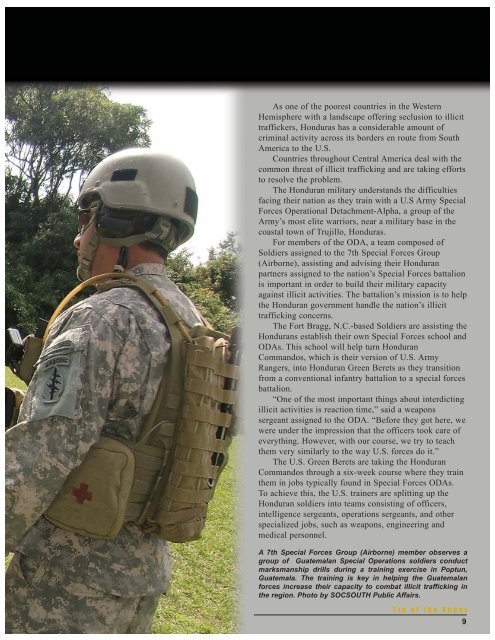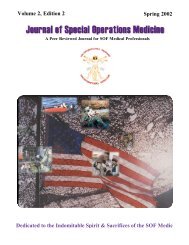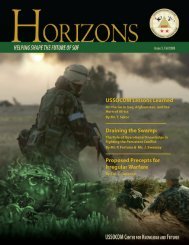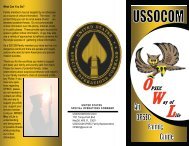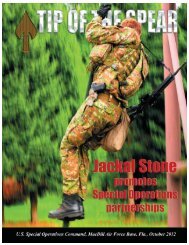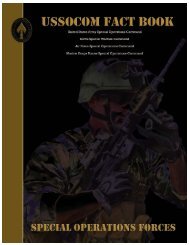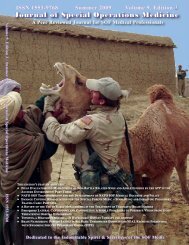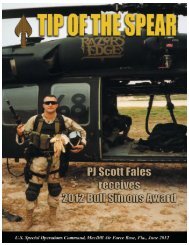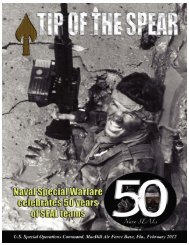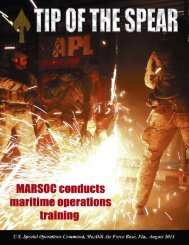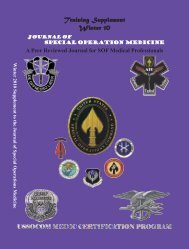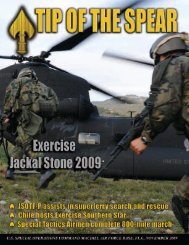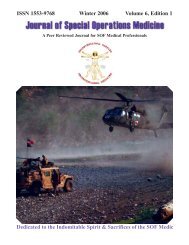February 2011.qxd - United States Special Operations Command
February 2011.qxd - United States Special Operations Command
February 2011.qxd - United States Special Operations Command
You also want an ePaper? Increase the reach of your titles
YUMPU automatically turns print PDFs into web optimized ePapers that Google loves.
As one of the poorest countries in the Western<br />
Hemisphere with a landscape offering seclusion to illicit<br />
traffickers, Honduras has a considerable amount of<br />
criminal activity across its borders en route from South<br />
America to the U.S.<br />
Countries throughout Central America deal with the<br />
common threat of illicit trafficking and are taking efforts<br />
to resolve the problem.<br />
The Honduran military understands the difficulties<br />
facing their nation as they train with a U.S Army <strong>Special</strong><br />
Forces Operational Detachment-Alpha, a group of the<br />
Army’s most elite warriors, near a military base in the<br />
coastal town of Trujillo, Honduras.<br />
For members of the ODA, a team composed of<br />
Soldiers assigned to the 7th <strong>Special</strong> Forces Group<br />
(Airborne), assisting and advising their Honduran<br />
partners assigned to the nation’s <strong>Special</strong> Forces battalion<br />
is important in order to build their military capacity<br />
against illicit activities. The battalion’s mission is to help<br />
the Honduran government handle the nation’s illicit<br />
trafficking concerns.<br />
The Fort Bragg, N.C.-based Soldiers are assisting the<br />
Hondurans establish their own <strong>Special</strong> Forces school and<br />
ODAs. This school will help turn Honduran<br />
<strong>Command</strong>os, which is their version of U.S. Army<br />
Rangers, into Honduran Green Berets as they transition<br />
from a conventional infantry battalion to a special forces<br />
battalion.<br />
“One of the most important things about interdicting<br />
illicit activities is reaction time,” said a weapons<br />
sergeant assigned to the ODA. “Before they got here, we<br />
were under the impression that the officers took care of<br />
everything. However, with our course, we try to teach<br />
them very similarly to the way U.S. forces do it.”<br />
The U.S. Green Berets are taking the Honduran<br />
<strong>Command</strong>os through a six-week course where they train<br />
them in jobs typically found in <strong>Special</strong> Forces ODAs.<br />
To achieve this, the U.S. trainers are splitting up the<br />
Honduran soldiers into teams consisting of officers,<br />
intelligence sergeants, operations sergeants, and other<br />
specialized jobs, such as weapons, engineering and<br />
medical personnel.<br />
A 7th <strong>Special</strong> Forces Group (Airborne) member observes a<br />
group of Guatemalan <strong>Special</strong> <strong>Operations</strong> soldiers conduct<br />
marksmanship drills during a training exercise in Poptun,<br />
Guatemala. The training is key in helping the Guatemalan<br />
forces increase their capacity to combat illicit trafficking in<br />
the region. Photo by SOCSOUTH Public Affairs.<br />
Tip of the Spear<br />
9


